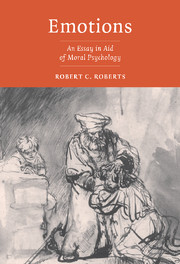2 - The Nature of Emotions
Published online by Cambridge University Press: 03 December 2009
Summary
A DOZEN FACTS
At a department meeting, my colleague George suggests that I should have last choice of upper-division course assignment, because I'm nothing but a middle-aged white protestant male, and besides that, ethics is a soft discipline and not serious philosophy. I get mad. I shall treat this as a paradigm case of emotion, making twelve remarks about it and cases of emotion that are unlike it in various ways. In doing so, I want to mark features of emotions that will need to be accommodated in any account of the nature of emotion. Some of these claims are controversial. Arguments for the more controversial ones will be found throughout this book. Remarks E1–E12 are not in any special order, particularly not in order of importance.
E1. I begin by noting that not only am I mad, I also feel mad. In feeling angry, I am aware of being angry. In English “feeling” functions, in some contexts, as a synonym for “emotion.” Yet “feel an emotion” is not redundant in the way that “feel a pain” is. A “pain” that is not felt is not a pain, but unfelt emotions are common. Novelists describe, and psychotherapists regularly confront, people who are angry, resentful, envious, and anxious, yet do not feel these emotions. Not only can a person have an emotion he does not feel, he can feel an emotion he does not have. For example, a person might feel pity for a sufferer when he does not in fact pity the sufferer, or feel anxious when in fact he is not anxious but is in the early stages of flu (see Section 4.7. Summary: Emotions are paradigmatically felt, but emotions may occur independently of the corresponding feeling, and the feeling of an emotion can be nonveridical, illusory.
[…]
- Type
- Chapter
- Information
- EmotionsAn Essay in Aid of Moral Psychology, pp. 60 - 179Publisher: Cambridge University PressPrint publication year: 2003



